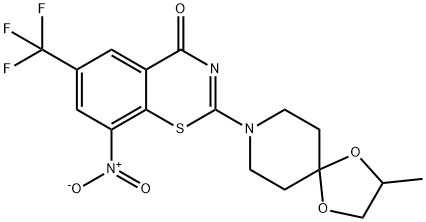Biological Activity
mic: 1 ng/ml (2.3 nm) for m. tuberculosis h37rv and 4 ng/ml (9.2 nm) for mycobacterium smegmatisthe loss of human lives to tuberculosis (tb) continues unabated as a result of poverty, synergy with the hiv/aids pandemic, and the emergence of multidrug- and extensively drug-resistant strains of mycobacterium tuberculosis. btz043 is the most advanced candidate for inclusion in combination therapies for both drug-sensitive and extensively drug-resistant tb.
in vitro
btz043 displayed similar activity against all clinical isolates of m. tuberculosis that were tested, including extensively drug-resistant and multidrug-resistant strains, indicating that it targets a previously unknown biological function. btz043 is bactericidal, reducing viability in vitro by more than 1000-fold in under 72 hours, which is comparable to the inh killing effect [1].
in vivo
the in vivo efficacy of btz043 was assessed 4 weeks after a low-dose aerosol infection of in the chronic balb/c mice model of tb. four weeks of treatment with btz043 reduced the bacterial load in the lungs and spleens by 1 and 2 logs, respectively, at the concentrations used. additional findings suggest that btz efficacy is time- rather than dose-dependent [1].
References
[1] makarov v, manina g, mikusova k, et al. benzothiazinones kill mycobacterium tuberculosis by blocking arabinan synthesis. science. 2009 may 8;324(5928):801-4.
